Voter Turnout In 2014 Midterms Hit Lowest Point Since 1942
Voter Turnout was lower this year than in any midterm since the one held eleven months after the attack on Pearl Harbor.
As we headed into the midterm elections, there were some signs that voter turnout, which has historically been lower in midterm elections than in Presidential election years, would be lower this year than it had been in some time. Polling indicated, for example, that a large segment of the American public was not engaged in following the elections very closely, and that many Americans didn’t really care who controlled Congress in the end. Additionally, several pundits observed that turnout in the primaries leading up to the General Election was down despite the fact that there had been several well publicized and closely fought battles in states like North Carolina, Georgia, Kentucky, and Mississippi. To some degree, those predictions of lower turnout seemed like they might not turn out to be accurate when early voting numbers from states like Iowa and Colorado seemed to indicate an uptick in participation. In the end, though, the predictions seem to have panned out, with early numbers indicating that voter turnout this year was the lowest it has been since World War II;
General election voter turnout for the 2014 midterms was the lowest it’s been in any election cycle since World War II, according to early projections by the United States Election Project.
Just 36.4 percent of the voting-eligible population cast ballots as of last Tuesday, continuing a steady decline in midterm voter participation that has spanned several decades. The results are dismal, but not surprising — participation has been dropping since the 1964 election, when voter turnout was at nearly 49 percent.
The last time voter turnout was so low during a midterm cycle was in 1942, when only 33.9 percent of eligible voters cast ballots.
Voter turnout during presidential elections is, as a rule, significantly higher. More than 58 percent of eligible voters submitted ballots in 2012 and nearly 62 percent did so in 2008. By contrast, only 41 percent of eligible voters voted in 2010 and 40.4 percent in 2006.
PBS’s Morning Line passes along this chart showing how voter turnout has gone since that 1942 midterm, which of course occurred less than a year after the attack on Pearl Harbor and U.S. entry into the Second World War:
There are a few caveats worth taking note of when you look at this overall number, though, and they can be seen most apparently in the list of states where data indicates turnout saw its biggest increases and biggest declines:
Turnout increased in 14 states: Turnout actually increased in 14 states, plus D.C., from 2010-2014. In 10 of the 14, there were competitive to potentially competitive Senate races. In nine of the 14, there were governors’ races. Here’s where turnout increased, ranked by biggest increase:
1. Louisiana: +12.9% (38.9%-43.9%)
2. Nebraska: +10.1% (37.5%-41.3%)
3. Arkansas: +9.9% (37.5%-41.2%)
4. Wisconsin: +9.4% (52.0%-56.9%)
5. Maine: +7.4% (55.2%-59.3%)
6. New Hampshire: +6.8% (45.7%-48.8%)
7. Alaska: +6.6% (51.9%-55.3%)
8. Washington, D.C.: +4.8% (28.9%-30.3%)
9. Colorado: +4.7% (50.6%-53.0%)
10. Kentucky: +4.2% (42.4%-44.2%)
11. North Carolina: +3.8% (39.2%-40.7%)
12. Florida: +3.4% (41.7%-43.1%)
13. Kansas: +2.6% (41.7%-42.8%)
14. Iowa: +1.4% (49.9%-50.6%)
15. Oregon: +0.2% (52.6%-52.7%)It was down, though — and by a lot in many places — in 36 others. Here are the top 10 biggest decreases:
1. Missouri: -27.4% (44.5%-32.3%)
2. Washington state: -27.3% (53.1%-38.6%)
3. Delaware: -27% (47.5%- 34.5%)
4. California: -25.5% (44%-32.8%)
5. Indiana: -24.5% (37.1%-28.0%)
6. Oklahoma: -23.2 (38.8%-29.8%)
7. Nevada: -23% (41.3%-31.8%)
8. Alabama: -22.1% (43%-33.5%)
9. Utah: -20.7% (36.3%-28.8%)
10. Mississippi: -19.7% (37%-29.7%)
There’s one thing that distinguishes most of the states on the first list from nearly all the states on the second list. Namely, in one sense or the other, each of the fifteen states where turnout increased had at least one highly contested race on the ballot. In most cases, it was a Senate race that was the subject of both local and national attention due to the impact it could potentially have on the battle for control of the Senate. In each of these states, voters were subjected to months of television and radio advertisements exhorting them to support one candidate or the other, or attacking one candidate or the other, as well as mountains of campaign mail pieces showing up on their mail boxes and, in many cases, phone calls and knocks on the door as part of Get Out The Vote efforts. In fact, almost none of the states where the battle for Senate control, or a Governor’s office, was closely fought, are missing from this first list of states where turnout increased. Even Washington D.C. qualifies in this regard since the city was the site of both a highly contested race for Mayor and a campaign to legalize marijuana that were both the subject of much media attention leading up to Election Day. It’s also worth noting that two of these states, Oregon and Colorado, have mail-in ballot programs that make voting much easier than even an aggressive early voting program does. Given all of that, it’s not surprising at all that these states would see an increase in turnout.
By contrast, pretty much all the states on the list of the ten states with the biggest drop off in turnout had what fairly could be considered a high profile, highly contested statewide race of any kind. There was no doubt about the outcome of any of the statewide races in California, for example, and the same was true in states like Idaho, Oklahoma, and Mississippi. In many of the other states, the highest profile races were all at the House level, most of which were not strongly contested to begin with and few of those that were occurred in high population districts that would bring large numbers of people to the polls. In Alabama, for example, the one statewide race was a race for Senate in which state Democrats declined to even put up a candidate against Senator Jeff Sessions. Similarly, the Senate race in Delaware was not nearly as prominent in the national media as it had been four years ago when Christine O’Donnell’s bizarre campaign drew national attention, and there was never really any doubt that Senator Thad Cochran would easily dispatch his Democratic opponent in Mississippi even though there had been threats from some supporters of Chris McDaniel that they would back Cochran’s opponent in the General Election. As with the states in the first list, is it really that much of a surprise that races that were not hotly contested, to the extent they were contested at all, didn’t see high turnout? Whether you were a supporter or opponent of Governor Jerry Brown, for example, it was obvious that it really didn’t matter whether or not you showed up to vote on Tuesday. None of this is to say that lower voter turnout isn’t something worth being concerned about, of course, but when you look at these numbers in the context of the election itself, they aren’t terribly surprising.
One thing that these numbers do say, though, is that Republicans ought to be careful about drawing any deep conclusions about what the 2014 elections mean, or asserting that the outcome as a whole gives them some kind of national mandate to enact their agenda. It is true, of course, that turnout was up in states when Republicans did well such as Colorado, Iowa, and Arkansas, but even in those states where turnout was up it was, for the most part, still just barely above 50% or, in most cases, below that level and most assuredly below the turnout level that you’d see from a Presidential election. Given that, it seems difficult to accept the assertion that the outcome of these races, although assuredly an important political development that will have consequences going forward at the state and national levels, is indicative of a sea change of any kind, or that it represents some kind of wholesale acceptance of Republican ideas by the American public. More likely than not, the voters who did come to the polls on Tuesday were motivated as much by frustration at the status quo, at President Obama, and at gridlock in Washington as they were by the intention of endorsing whatever it is Republicans intend to do over the next two years. Just as we saw when voters went to the polls just two years after giving Republicans an historic win in the 2010 House elections, the GOP could very well find that they get a very different reception when 2016 comes around and, presumably, turnout ends up being much higher than it was this year.
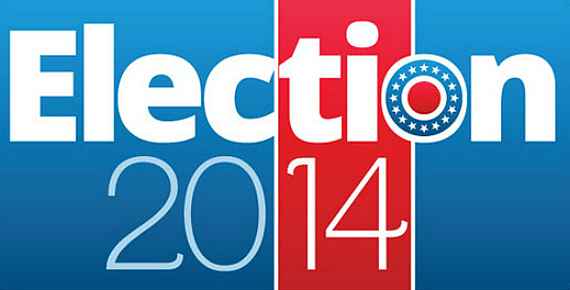
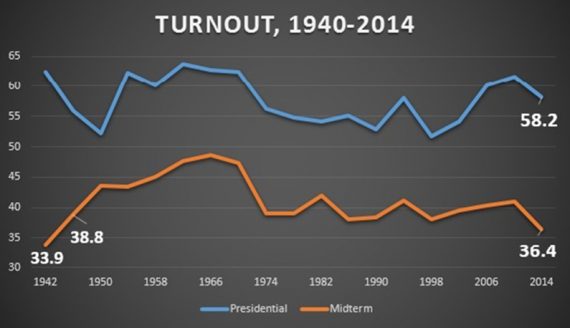

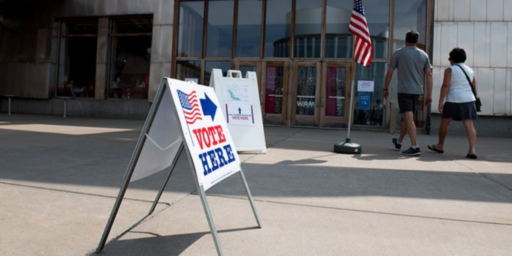
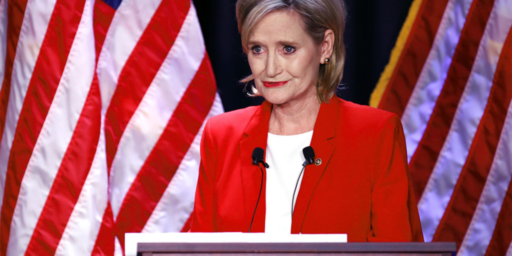
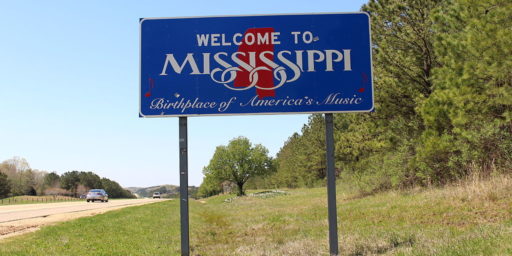
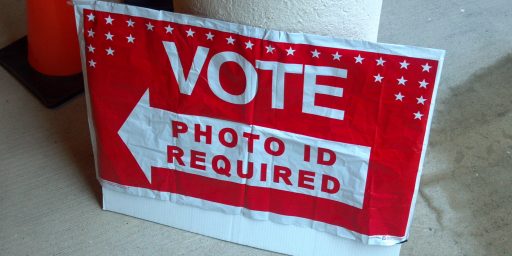
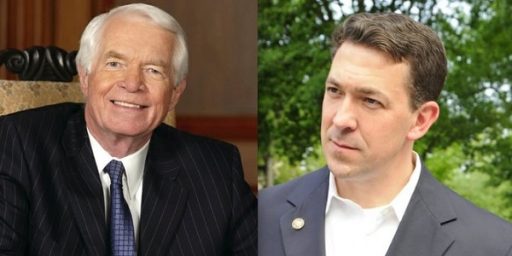
Here in CA turnout was down a lot, primarily because Jerry Brown had token opposition as he sought his 4th term, and because he’s done an excellent job. Jerry Brown truly is the best governor that Republicans could hope for – he’s not tethered to anyone’s agenda and he’s basically, for all intents and purposes, a centrist governor.
What was surprising was that there were 3 statewide offices that Republicans thought they’d take – Secretary of State, Controller, Insurance Commissioner – they had younger decent candidates who were not in on the cultural issues at all – they lost all three.
you probably mean 2012 here, right?
The Democrats have a mid term elections problem , and the Republicans have a Presidential election problem. Essentially, two different Americas come out to vote every two years.
Another way to put it is that the (anti Obama)Republican electorate showed up in the mid terms, and the (pro Obama) Democratic electorate didn’t.
@stonetools:
I revised that sentence to make the point clearly.
The other point worth noting that I didn’t touch on here is that the states where turnout was up where, by and large, states where Republicans tend to do well generally even in Presidential election years.
The most contested here in Oregon was Marijuana legalization and labeling foods with GMOs. The state wide offices were all a slam dunk for the Democrats.
I have a question for Pinky, John425, Gravilo, JKB, and the rest of our conservative brethren – except for Jenos, SuperDestroyer, and Florack. I don’t engage those three and would prefer not to do so here.
Kansas: All GOP all the time. Every right wing policy has been put into place in Kansas. Tax Cuts for people and businesses. Less regulation. Less money for public schools. Severe abortion restrictions. etc. etc. Result: Huge Budget Shortfall. Unemployment above national average. Stagnant wages.
California: All Dem all the time. A Democratic Goverenor and legislative bodies both controlled by Dems. Result: Balanced budget. Unemployment below national average. Rising wages.
Hmmmm….
The question is: Why are the GOP policies failing in Kansas? It’s a simple question. And the answer can’t be “It’s Obama’s fault”. Give me a specific reason as to why Kansas is going the way it’s going if all the GOP policies are supposed to work so well.
Yet another data point the Republicans need to consider if they want to save the party. The Democrats may have been voted out. But the Republicans were only voted in by default. No one is enthusiastic about them. Nor will they be as long as people like Ted Cruz are running the show.
The lowest turnout since Pearl Harbor…and old folks outnumbered young folk by 3:1.
It was a FOX News Election…a few old people whipped into a frothy frenzy of hate and anger.
@EddieInCA:
Unemployment rates:
Kansas 4.8%
California 7.3%
National Average 5.8%
Get your facts straight, genius.
@Gavrilo:
California also has one of the highest Gini coefficients in the country; Kansas one of the lowest (the lowest? Ultra-conservative Utah). California has a huge gap between Hollywood/Silicon Valley and the rest of the state.
@Gavrilo:
If you take the numbers out of context…then you are absolutely correct.
In context…Cali peaked out at 12.5% and has dropped over 5% points…while their labor force has continued to grow significantly.
So on net…a great improvement.
Kansas has dropped 2% points since peak UE…while it’s labor pool has also shrunk. It’s far easier to reduce un-employment when people are fleeing the state.
So on net…meh.
In either case you fail to address the meat of the question…which is why Kansas, after a full implementation of the Republican Agenda…is still mired in mediocrity…with a $300M budget shortfall and they have had their bond rating reduced twice. All the the growth in economic activity, jobs and population that Brownback promised…and Republicans always promise will happen as a result of their agenda…has failed to materialize.
A shot of adrenaline…not so much.
@Gavrilo:
@Hal_10000:
For the record::
The unemployment rate in Silicon Valley is 5.1%, and it is 4.7% in (The People’s Republic of) San Francisco, both of which are lower than the national average.
The overall rate in CA is 7% and that is primarily due to high unemployment in the agriculture industry dominated Central Valley (10% in Fresno County). It (the UE rate) has been declining here in CA since the depths of the Great Recession. That is generally true for the nation as a whole.
HS graduation rate by state, 2010-2011:
California total 76%
Special needs 59%
ESL 60%
Economically disadvantaged 70%
Kansas total 83%
Special needs 73%
ESL 70%
Economically disadvantaged 73%
@C. Clavin:
I didn’t take anything out of context, genius. Eddie picked unemployment above/below the national average as one of the criteria, not me. I simply pointed out that he’s full of $hit. Now, you want to move the goalposts. Nice try.
@Gavrilo:
Wow. Look at the two trends, genius. While the unemployment numbers are this point in time are exactly as you say you are, looking at the overall unemployment picture for both states, creates a much different view. One is flat, and other is declining. California shows a tremendous improvement since the voters of California got rid of the Republican obstructionism in Sacramento. California has a budget surplus after many years of budget shortfalls.
Kansas is drowning. Yet you want to shout “squirrel!!!!!” to have people not pay attention to the reality.
Why is Kansas drowning? It’s a simple question.
Care to actually try to answer the question?
@Pinky:
That’s your answer? Really? Cherry picked stats on Graduation? That’s the best you have?
@EddieInCA:
Pinky was trying to point out that there are more people classified as economically disadvantaged, and with “Special Needs” in Kansas than there are in California.
@Gavrilo:
He screwed up the rates. Yes. But you still failed to answer the question.
@EddieInCA:
One is flat because it’s one of the lowest rates in the country. The other is declining and is still one of the highest rates in the country. Again, I didn’t pick unemployment as a measure of how great California is. You did. Unemployment is declining in California? So what? It’s still one of the highest rates in the country.
@Gavrilo:
@Gavrilo: @Gavrilo:
Okay. Since you won’t answer the question posed, I’ll try again.
Since August 2010, California unemployment has dropped from 12.4% to 7.4% (42% drop)
Since August 2010, Kansas unemployment has dropped from 7.1% to 4.9% (31% drop)
California has a budget surplus this year, thanks to a common sense approach to governing. A mixture of targeted tax raises, and some spending cuts.
Kansas has a historic budget deficit, with no plans on how to make up the funds, other than continuing the slash spending.
California still has people coming into the state to live at a higher rate than Kansas.
By most metrics, California is doing well. Kansas, not so much.
So… again…. why is Kansas not doing as well as California, given that the GOP has put into place every single GOP Policy?
Why?
Answer THAT.
@EddieInCA:
Dude, you’re in a hole. Stop digging! California’s unemployment rate sucks compared to Kansas’. Stop trying to find a way to make the numbers work.
@Gavrilo:
In other words you got nothing. You could have just said that.
But it’s OK….I’ve posed the very same question to a couple of the other wing-nuts that lurk hereabouts and they had nothing either.
Republicans just do not want to talk about Kansas…or Minnesota…or Wisconsin…or NJ…State level laboratories where the Republican economic experiment has failed.
That’s why I call Republican economic theory RADICAL…because it has no historical record of success…anywhere.
Kansas’ budget is a problem, yes. They cut taxes far too severely. They still have less unemployment, less inequality, a lower poverty rate and a better high school graduation rate than California. It’s nice that California is climbing out of what was a much steeper hole. It’s still behind Kansas.
@Gavrilo:
Still can’t (won’t) address the point. Your lack of a cogent rebuttal speaks loudly for you.
Next time, just say “I got nothing.” You won’t embarrass yourself that way.
@Hal_10000:
Hal –
I know you to be honorable – and I’ve been arguing with you for too long a time – but that’s just horseshit.
By most metrics, California is doing much better than Kansas. But I guess it’s true that you can make up your own facts. Cuz you’re doing it right there.
I do miss Lee though, still. Alot of people from that old site don’t know that I actually hired Lee twice, despite our virulent disagreements online. He was a very good VFX guy, and he did good work for me. I often wonder how Lee would be reacting to the Tea Party. I think you and I would disagree (maybe not), but I don’t see our old friend Lee putting up with the likes of Sarah Palin, Ted Cruz, or even Scott Walker, were he still alive.
@EddieInCA:
Ok. Just admit that you were completely wrong about the unemployment rates, and admit that Kansas’ unemployment rate is much, much better than California’s. Then, I’ll move on to your budget deficit argument.
@Hal_10000:
A steeper hole that they slid into, thanks to Republican obstructionism. :-).
The plain fact is that a lot of Sam Brownback’s policies just didn’t work. Tax cuts aren’t the big revenue producing elixir he promised.
If they go on current trajectories, California WILL be ahead in a few years. Right now , though , its not.
@EddieInCA: Why August 2010? How does that help us isolate the effects of party and policy? I don’t remember Arnold governing particularly conservatively, and he never had control of the legislature. From a quick look at Wikipedia, it looks like the Democrats haven’t had control of the Kansas Senate in 98 years.
I get the question you’re trying to ask, but it seems both misleading and simplistic. A state isn’t simply the party in control of it. I’ll admit that I don’t know much about Kansas politics – I’ve been talking about that for the past few months on this site, because I didn’t understand the conviction that Brownback and Roberts were doomed. I’ve heard that Brownback has increased the funds going to education, just not as much as others would have liked, but I haven’t investigated that. I’m a little skeptical of the way you’ve framed the whole thing, since even by your own conditions California is doing worse than Kansas. But I’ll leave this up to people who know more than me.
Doug, in addition to the other factors, I’d blame the nihilistic war waged by the GOP. Their strategy from the start of President Obama’s term was 100% opposition, and ‘the worse the better’.
Democrats are pathetic (note that I’m saying that as someone who is likely to agree with many of their policy positions). This is what happens when they buy into the Republican/media narrative that the President is “unpopular” and should therefore be avoided. Look no further than immigration reform. The President held off on the executive actions he promised largely at the behest of Democratic incumbents or candidates who ended up losing anyway. When red/purple State Democrats going to learn that it makes no sense trying to win over voters who will never, ever, ever (to borrow from Taylor Swift) vote for anybody with a (D) after their name … no matter how much they claim to be “independent”?
Low turnout is another way of saying “none of the above”.
It doesn’t say much about either party that they couldn’t convince so many people that it wasn’t worth an hour’s effort to vote for them (or even against the other).
I think the Republicans are definitely worse than the Democrats, but that’s like saying a mark of 12% is worse than a mark of 19%. Voter turnout suggests I’m not alone in that assessment.
OK, let’s ask the hard question:
How did the states with restrictive VoterID laws fare?
@EddieInCA:
I’m hesitant to speak for him. But I am pretty sure Lee would have had little patience with Sarah Palin and Ted Cruz. They were the sort of blustering anti-intellectual culture conservatives that drove him nuts. He probably would have been more sympathetic to Walker, who, unlike Palin, has actually governed a state for more than a whole two years in a row. And probably to the Tea Party to some extent, since he liked political outsiders.
I may be projecting, because I can’t stand Cruz and Palin. Palin especially speaks in smarmy condescending no-nothingism, uttering factually challenged cliches that rile up the base but do nothing to advance the debate. But I’m pretty sure Lee would not have liked them either.
@Hal_10000:
I think it shows how well you knew him that you write that. I agree with you 100%.
I think Lee would have liked Kasich and Christie more than Walker, only because I knew Lee didn’t have that big of a problem with Unions like Walker seems to have – which makes sense given that Lee spent so much of his time surrounded by union employees in the film business.
I’m glad you’ve kept the site up, even though I don’t visit nearly as often as I should.
Rest In Peace, Big Man.
@EddieInCA: Balanced budget? You ever looked at the unfunded pension liabilities the California Democrats are “enjoying”?
@John425: It’s nonsensical to suggest a budget is only balanced if it does so in perpetuity, as any efforts toward such a goal would not be binding on future lawmakers.
@Ben Wolf: It’s worth looking at pension liabilities, because a lot of states balance their budgets by shifting money away from them. Interestingly, California and Kansas have nearly identical unfunded pension liabilities per capita.
Surplus: an amount of something left over when requirements have been met;…..It is nonsensical to suggest Cal has a “surplus” when ‘requirements” have clearly not been met …..indicating Cal has a surplus is an oxymoron…..this creepy alliance, which questions nothing….is mind-boggling-
a majority of 33% is hardly a mandate.
The only things the 2014 election results proved,are
1)Republicans are better liars than Democrats
2)If you tell a lie loud enough,and often enough,some will believe it,others will just get disgusted and stay home It is a lesson the GOP(Get Obama Party) learned from a little clubfooted Nazi in World War Two Germany.
3)Republican voter suppression efforts worked
4)Republicans can’t win if voters are engaged
5) Republicans count on voters being,naive,forgetful,apathetic,gluttons for punishment,and just plain stupid enough to vote against their own interests.
But none of that will matter in 2016. Even those who voted Republican in 2014,will realize their error,when the GOP run Congress starts screwing with their livelihoods.
@Christopher Bowen: Without them thr GOP would not have won the Senate,or the Florida Governors race.